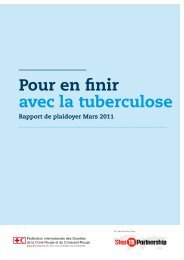Thailand - Stop TB Partnership
Thailand - Stop TB Partnership
Thailand - Stop TB Partnership
You also want an ePaper? Increase the reach of your titles
YUMPU automatically turns print PDFs into web optimized ePapers that Google loves.
the political agenda, not only of the health ministry, but also of the ministries of finance<br />
and planning.” 11<br />
The marginality of the Declaration at the country level is symptomatic of a broader<br />
issue: insufficient public awareness of the scope and seriousness of the <strong>TB</strong> epidemic. Global<br />
incidence of <strong>TB</strong> has increased over the past 10 years. 12 <strong>TB</strong> kills approximately 2 million<br />
people a year 13 and is a leading cause of death by infectious disease for people living with<br />
HIV/AIDS. Yet when contrasted with the extent of social mobilization around health issues<br />
such as HIV/AIDS, the general lack of awareness that <strong>TB</strong> is a serious health threat is striking.<br />
Lack of awareness<br />
There is nothing more than a poster on the wall in health facilities to<br />
promote awareness.<br />
—Ezio T. Santos Filho, Public Health Watch researcher, Brazil 14<br />
Public Health Watch researchers from all five countries identified lack of awareness about<br />
<strong>TB</strong> at all levels as a critical issue—one that has multiple adverse consequences and implications<br />
for the effectiveness of <strong>TB</strong> control efforts.<br />
In the high-burden countries under study, many people do not know the basic<br />
facts about <strong>TB</strong>: how the disease is transmitted; that it can be treated and cured; and where<br />
to access free treatment. In Bangladesh, where over half of the population is infected with<br />
the <strong>TB</strong> bacillus, a recent study found that some women believed they could get <strong>TB</strong> by wearing<br />
torn slippers. 15 According to one Nigerian doctor, “most people [in Imo State] still think<br />
that <strong>TB</strong> patients have been poisoned. Some think it is a curse from the gods—especially<br />
when many family members get infected—and go to fortune tellers and prayer houses for<br />
deliverance.” 16 Even groups at an elevated risk of <strong>TB</strong> infection, including people living with<br />
HIV/AIDS, appear to lack information about <strong>TB</strong>. For example, a recent series of social mobilization<br />
workshops among HIV/AIDS activists in Brazil—where <strong>TB</strong> is one of the leading<br />
causes of death by infectious disease for people with HIV/AIDS—revealed that few participants<br />
knew even the basic facts about <strong>TB</strong> transmission and treatment. 17<br />
Lack of information can lead to delays in accessing treatment, increasing the potential<br />
for transmission of the disease. One recent study in Tanzania found that only 42 percent<br />
of <strong>TB</strong> patients visited a health facility within three months of the onset of symptoms; the<br />
median duration between onset of <strong>TB</strong> symptoms and visiting a health facility was about<br />
eight months. 18<br />
The low level of awareness extends to high-level political officials as well. The leader<br />
of one faith-based organization in <strong>Thailand</strong> remarked that “the general perception among<br />
political leaders as well as in Thai society is that <strong>TB</strong> has been completely eradicated.” 19<br />
16<br />
<strong>TB</strong> POLICY IN THAILAND



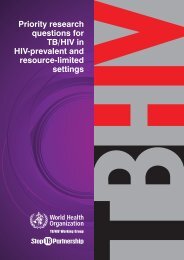

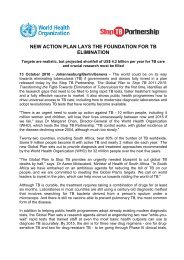

![Global Drug Facility Annual Report 2011 [.pdf] - Stop TB Partnership](https://img.yumpu.com/26788745/1/184x260/global-drug-facility-annual-report-2011-pdf-stop-tb-partnership.jpg?quality=85)

![Concept note on national stop TB partnership [.pdf]](https://img.yumpu.com/26788741/1/184x260/concept-note-on-national-stop-tb-partnership-pdf.jpg?quality=85)

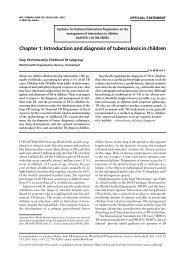
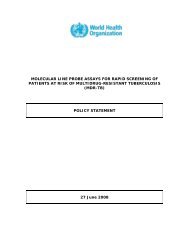
![2005 and Challenges for 2006 - 2015 [.pdf] - Stop TB Partnership](https://img.yumpu.com/26788674/1/190x245/2005-and-challenges-for-2006-2015-pdf-stop-tb-partnership.jpg?quality=85)
![Brochure (French) [.pdf] - Stop TB Partnership](https://img.yumpu.com/17234792/1/190x91/brochure-french-pdf-stop-tb-partnership.jpg?quality=85)

